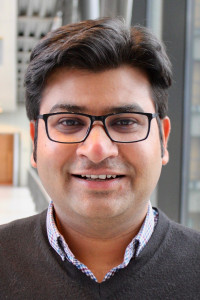Dr. Sumit Kumar
Research:
I am interested in understanding crosstalk between SUMOylation and Phosphorylation during cell cycle progression and cancer development. The SUMO pathway is essential for cell cycle progression and its functions can’t be taken over by other Ubiquitin family members. Many cell cycle regulators are functionally regulated via SUMOylation and phosphorylation. Deregulation of both modifications causes severe defects in many biological processes and are linked to cancer development. To dissect the molecular functions of mitotic regulators and their target proteins we are employing both in vitro and in vivo approaches consisting of genome editing, mass spectrometry, protein biochemistry, high resolution microscopy and mice models.
Curriculum Vitae:
I completed my PhD in the laboratory of Prof. Dr. Thomas Holstein and Dr. Suat Ozbek at University of Heidelberg, Germany. My doctoral research focused on understanding the molecular basis of Wnt binding to Frizzled and LPR5/6 co-receptor. I then moved to the Max Planck Institute of Biochemistry in Munich as Postdoctoral fellow, investigated the role of human ATG16L1 and ATG8 homologs in mammalian autophagy employing CRISPR/Cas9 system. In June 2016, I joined Alfred Vertegaal laboratory as postdoc, where I am investigating the role of SUMO signaling in cell cycle progression and cancer development.
Publications
-
Molecular dissection of Wnt3a-Frizzled8 interaction reveals essential and modulatory determinants of Wnt signaling activity.
Kumar. S, Žigman M., Patel T.R., Trageser B., Gross J. C., Boutros M., Gradl D., Steinbeisser H.,Stetefeld J., Holstein T and Özbek S.,
BMC Biol. 2014. doi: 10.1186/1741-7007-12-44.




